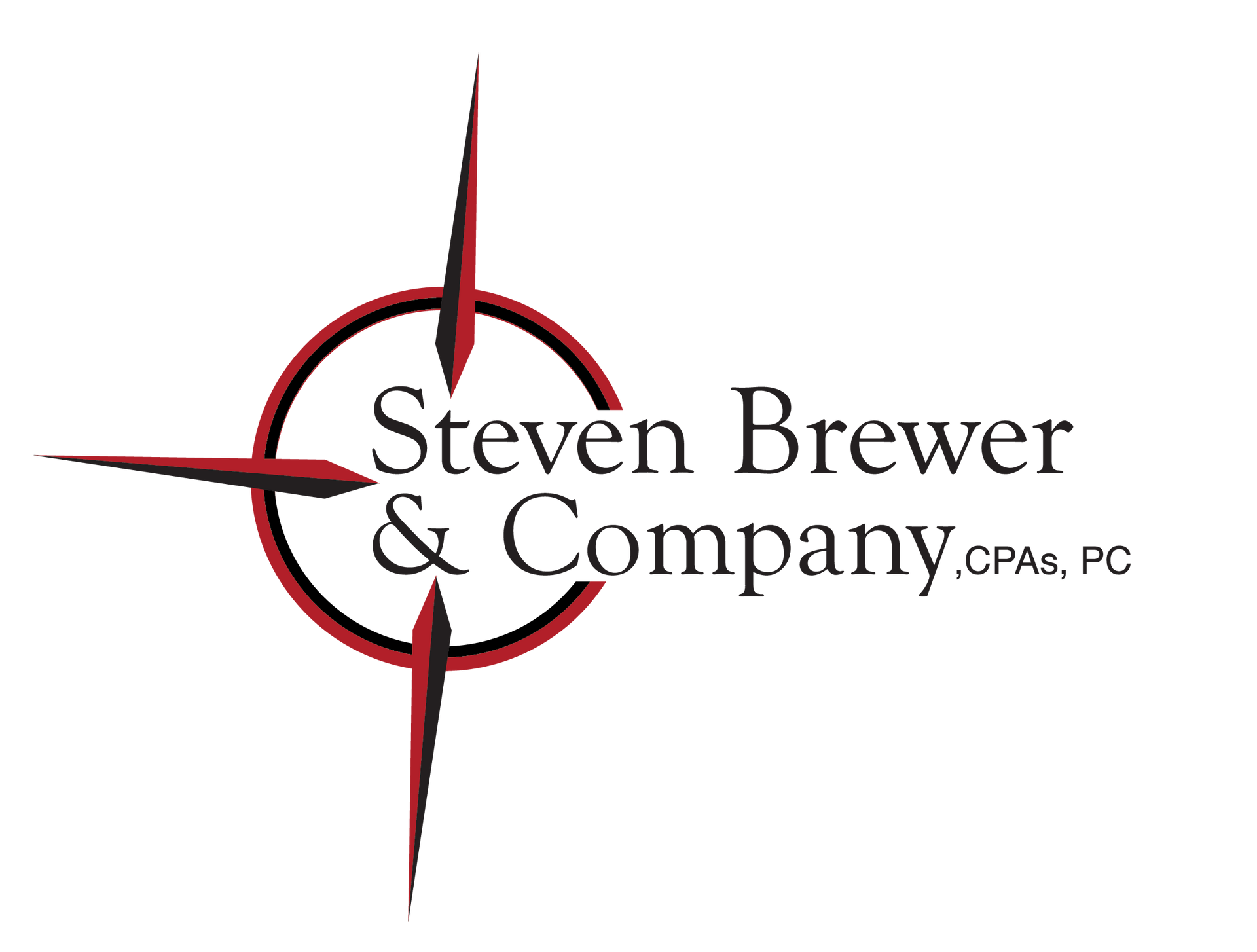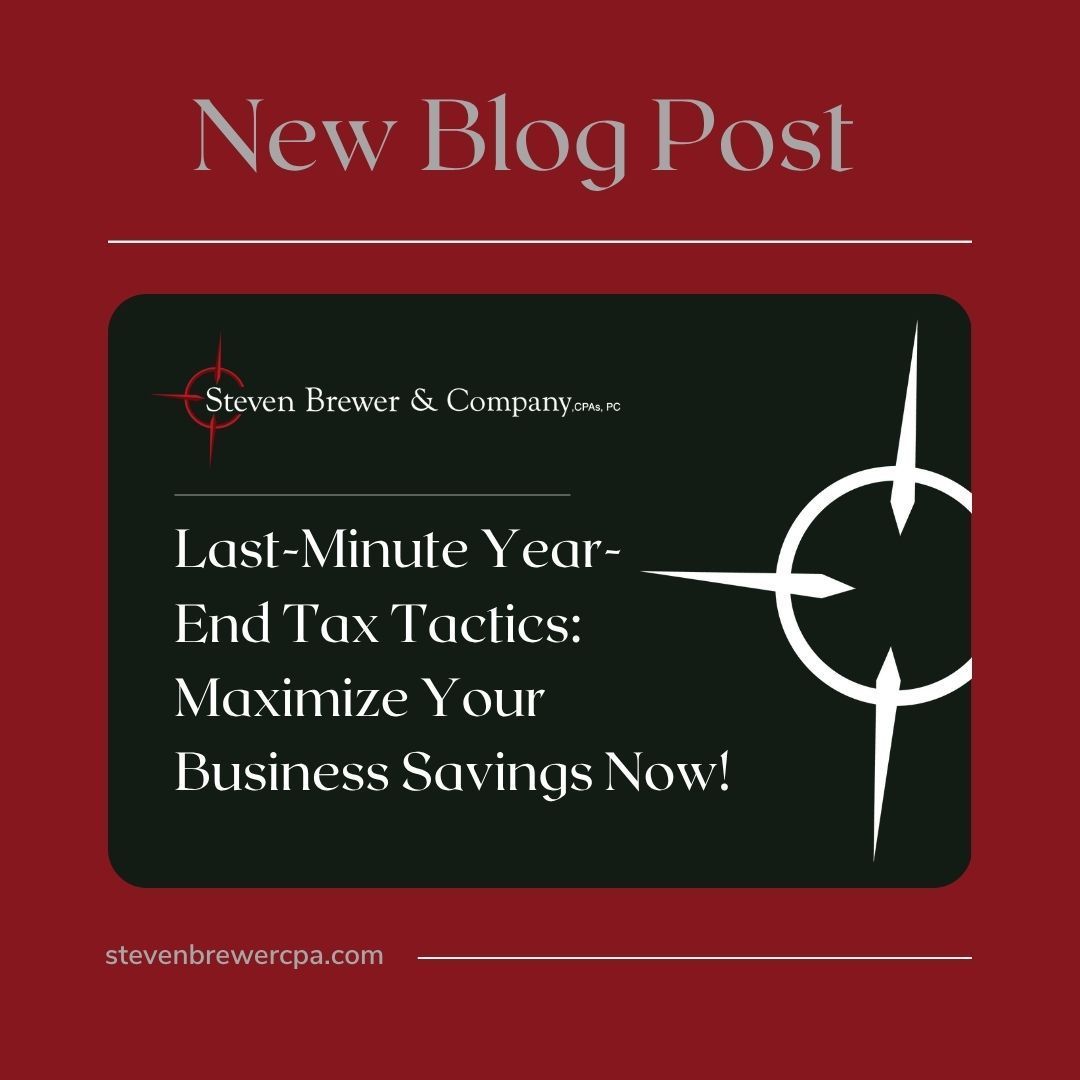Want more information?

Steven Brewer & Company, CPA's PC
© 2025
Latest news

December 12, 2025
Are you ready to make the move? Are you looking for someone to help you grow your business? A CPA firm who cares about not only your business but you as a person? A firm which can bring insight into your business? One that looks out for your best interests while keeping you compliant with all the IRS, state and other financial regulations? If so, we are looking for you! Steven Brewer & Company, CPAs, is brick and mortar office with a strong virtual presence. We are looking for the right clients to join us. Currently we work with over 35 companies in 20 states. We know how to work virtually with our clients. We work to help you understand your business; help you plan for the future and use your business assets in planning for the best results in building your future. If you are looking for all of this, give us call (812-883-6938) or drop us an email (admin@stevenbrewercpa.com) to schedule a meeting to discuss your financial needs. In the meantime, check out our website, stevenbrewercpa.com, to find out more about us.

December 10, 2025
As the year draws to a close, small business owners find themselves in a crucial period for financial organization and tax strategy optimization. With the potential to significantly reduce your 2025 tax bill, implementing effective tax strategies now becomes imperative. By maximizing savings, managing cash flow, and ensuring compliance with tax deadlines, you can position your business more robustly for the upcoming year. Taking decisive action before December 31 is essential. To assist you in this critical period, here’s a year-end tax planning checklist to help small businesses take control and uncover valuable tax-saving opportunities. Buy Equipment and Other Fixed Assets: One of the most effective ways to generate tax deductions is to buy equipment, machinery and other fixed assets needed for the business and place them in service by Dec. 31. Ordinarily these assets are capitalized and depreciated over several years, but there are a few options for deducting some or all these expenses immediately, including: - Section 179 Expensing - This break allows you to deduct up to $2.5 million ($1.25 million if filing married separate) in expenses for qualifying tangible property and certain computer software placed in service in 2025. It’s phased out on a dollar-for-dollar basis to the extent Sec. 179 expenditures exceed $4 million. Section 179 expensing allows businesses to immediately deduct the cost of certain qualifying property, rather than depreciating it over time. This includes tangible personal property purchased for use in an active trade or business, such as machinery, equipment, and off-the-shelf software. Certain improvements to nonresidential real property, like roofs, HVAC systems, and fire protection systems, also qualify. However, buildings and structural components generally do not qualify unless they fall under the category of "qualified real property," which includes specific leasehold, restaurant, and retail improvements. The property must be used more than 50% for business purposes and placed in service during the tax year the deduction is claimed. - Bonus Depreciation - Bonus depreciation saw a significant enhancement due to legislative changes made by the OBBBA, which increased the depreciation rate to a full 100% for qualifying property purchased after January 19, 2025. Previously set at 40% for 2025, this change, which OBBBA made permanent, enables businesses to immediately deduct the entirety of the cost of qualifying property in the year it is placed in service, providing a powerful tax-saving tool. Qualified property for bonus depreciation includes tangible personal property with a Modified Accelerated Cost Recovery System (MACRS) recovery period of 20 years or less, most computer software, certain leasehold improvements, and specific transport utility property. This depreciation benefit applies to both new and used assets acquired and placed in service after the designated date, offering businesses increased flexibility in managing their capital expenditures. - De Minimis Safe Harbor - The de minimis safe harbor rule offers an opportunity to directly expense certain low-value items used in your business, bypassing the usual process of capitalizing and depreciating them as fixed assets. If your business maintains applicable financial statements, you can write off expenses of up to $5,000 per item or invoice for these purchases, assuming they're also expensed for accounting purposes. Without such financial statements, the cap is lowered to $2,500. Despite its "de minimis" label, this provision allows for substantial immediate deductions. For instance, purchasing ten computers at $2,500 each could enable you to claim an upfront deduction of $25,000. Year-end Inventory Management: Year-end inventory plays a significant role in determining a business's profit or loss as it directly affects the Cost of Goods Sold (COGS), which is a critical component of calculating gross profit. Cost of goods sold (COGS) is calculated as the beginning inventory plus purchases during the year minus the ending inventory. Thus, the value of the ending inventory directly reduces the COGS. A higher ending inventory results in a lower COGS, which increases gross profit and taxable income. Conversely, a lower ending inventory results in a higher COGS, reducing gross profit and taxable income. Here are some year-end strategies: Identifying and writing down obsolete or slow-moving inventory at year-end can lead to reductions in taxable income, as the inventory's reduced value is recognized as a loss. Delaying inventory purchases until after year-end, businesses can manage their COGS and effectively reduce taxable income, thereby optimizing their financial results for the current year. Contributing to a Retirement Plan: Retirement plan contributions not only offer significant tax advantages but also facilitate future savings for both business owners and employees. For self-employed individuals, contributing to a retirement plan such as a Simplified Employee Pension (SEP) IRA can be highly beneficial. Business owners can contribute up to 25% of their net self-employment earnings, with a maximum contribution of $70,000 for 2025. The advantage of a SEP IRA is its flexible contribution deadline, which extends until the tax return filing date, offering additional planning time. For sole proprietors, freelancers, and independent contractors, a Solo 401(k) presents an excellent opportunity due to its dual-role contribution system, where you are considered both employer and employee, allowing for substantial contribution limits. This makes it an ideal choice for maximizing retirement savings. Additionally, employers can enhance employee satisfaction and retention by offering year-end bonuses and retirement plan contributions, which are often deductible. This dual benefit of tax savings and employee incentive strengthens both the company's financial position and workforce stability. Maximize the Qualified Business Income (QBI) Deduction: As the year-end approaches, business owners should take strategic steps to maximize the Qualified Business Income (QBI) deduction (also known as the Sec 199A deduction), a vital tax benefit allowing up to a 20% deduction on qualified business income. To optimize this deduction, first review your income levels to ensure they fall below the $197,300 for single filers or $394,600 for joint filers threshold (2025 amounts) to avoid phase-outs. Adjusting a “working shareholder’s” W-2 wages appropriately, aligning with industry standards while considering IRS scrutiny, is essential for businesses structured as S corporations. Making capital investments can enhance deductions through Section 179 expensing or bonus depreciation, effectively lowering business income. Review Accounts Receivable for Bad Debts: As year-end approaches, business owners should evaluate their accounts receivable to consider writing off bad debts, which can provide valuable tax deductions. A bad debt is an uncollectible amount owed to your business, often arising from unpaid customer invoices or unreturned loans, and is categorized as either business or nonbusiness. To qualify for a business bad debt deduction, the debt must have been previously included in your business's income, and it should be related to regular business operations. For accrual method taxpayers, these debts are deductible in the year they become worthless. Documenting diligent collection efforts and the debt's worthlessness is crucial for IRS compliance. Effective management of bad debts not only cleans up financial records but also optimizes taxable income, ultimately enhancing your business’s financial health. Consult with a tax advisor to ensure you take full advantage of this deduction as part of your year-end tax strategy. Pre-Pay Expenses : As the year-end approaches, business owners can strategically manage their cash flow by prepaying expenses to reduce taxable income and, consequently, tax liability. By accelerating deductible business expenses such as insurance premiums, office supplies, or marketing costs before December 31st, you can effectively lower this year’s taxable income. This is especially beneficial for businesses using the cash accounting method, where expenses are deducted in the year they're paid. Prepaying up to 12 months of expenses, allowed under the IRS’s safe harbor rule, can be an effective way to pull deductions into the current tax year, provided income can be appropriately deferred without jeopardizing cash flow needs. Deferring Income: Deferring income to the following year can keep a business under certain tax thresholds, thus optimizing tax outcomes. For cash basis taxpayers, delaying client billing until after the new year means that income is counted when received. However, careful consideration is required to ensure that deferring income won't adversely affect business operations or relationships. Balancing these strategies allows business owners to manage their taxable income actively, ensuring smoother cash flow and potentially significant tax savings. First Year in Business? If so, you can elect to deduct up to $5,000 of start-up and $5,000 of organizational expenses in the first year of a business. Each of these $5,000 amounts is reduced by the amount by which the total start-up expense or organizational expense exceeds $50,000. Expenses not deductible in the first year of the business must be amortized over 15 years. Avoid Underpayment Penalties: If you are going to owe taxes for 2025, you can take steps before year-end to avoid or minimize the underpayment penalty. The penalty is applied quarterly, so making a fourth quarter estimated payment only reduces the fourth-quarter penalty. However, withholding is treated as paid ratably throughout the year, so increasing withholding at the end of the year can reduce the penalties for the earlier quarters. Here are some possible solutions: - If you have a qualified retirement plan, a temporary solution to address the under- withholding is to take an unqualified distribution from a qualified retirement plan, utilizing this as a temporary solution to address withholding shortfalls. Upon taking the distribution, 20% is automatically withheld for federal income taxes, providing an opportunity to catch up on required tax payments and avoid underpayment penalties. Meanwhile, you can mitigate tax implications by rolling over the full amount of the distribution, including the withheld portion, back into the plan within the 60-day window. This maneuver requires the use of other funds to cover the withheld amount during the rollover but allows for maintaining the tax-deferred status of the retirement savings and ensures compliance with rollover rules. This approach offers a unique yet viable method to align tax payments without incurring additional tax liabilities on the distribution. - If you are married and your spouse is employed, the spouse can increase withholding for the end of the year. Even withhold as much as the entire paycheck with the help of a cooperative employer. - If you have other sources of income subject to withholding, have the withholding increased appropriately. It may be beneficial for you to consult with this office to estimate your underpayment and whether an underpayment penalty exception might apply. Are You a Working Shareholder in an S Corporation? If so, you may not be aware of the IRS’s “reasonable compensation” requirements, which can influence your Section 199A (qualified business income) deduction and your payroll taxes. Reviewing the requirements as they apply to your circumstances may avoid future problems with the IRS. Planning on Paying Your Employees a Bonus? Consider paying your employees their bonuses before year-end, rather than after the start of the new year. That way you benefit from the tax deduction a year sooner. Reassess Your Business Entity: The end of the year is a smart time to evaluate whether your current business structure is still the best fit for your operations. Each structure has unique tax and liability implications. Options include sole proprietorships, partnerships, limited liability company, S Corporation and C Corporation. Conclusion : While year-end strategies primarily aim to manage and reduce income tax liabilities, it's important to remember their wider financial benefits. Implementing these strategies can also diminish the burdens of self-employment tax and business payroll taxes. By shifting income, optimizing deductions such as the Qualified Business Income (QBI) deduction, and making strategic investments or prepayments, businesses can decrease taxable income to more favorable levels, thus lowering associated tax obligations across the board. Such comprehensive tax planning not only enhances cash flow but also strengthens the financial position of the business, paving the way for a more robust and tax-efficient new year. As you finalize your year-end financial strategies, consider consulting with this office to ensure you maximize these opportunities across all tax dimensions.






